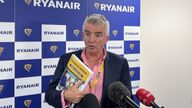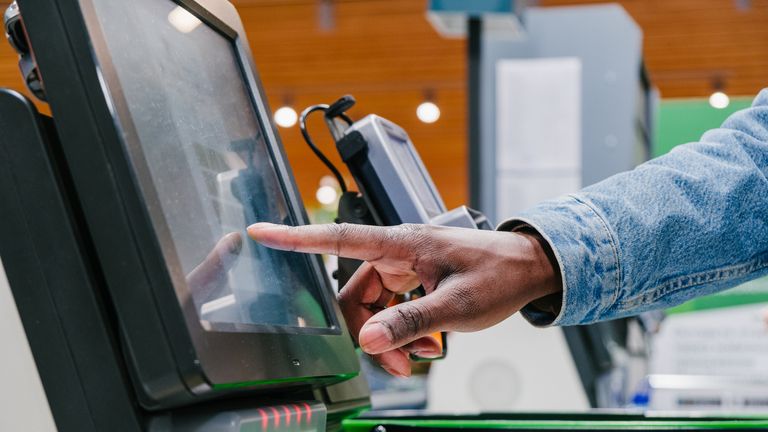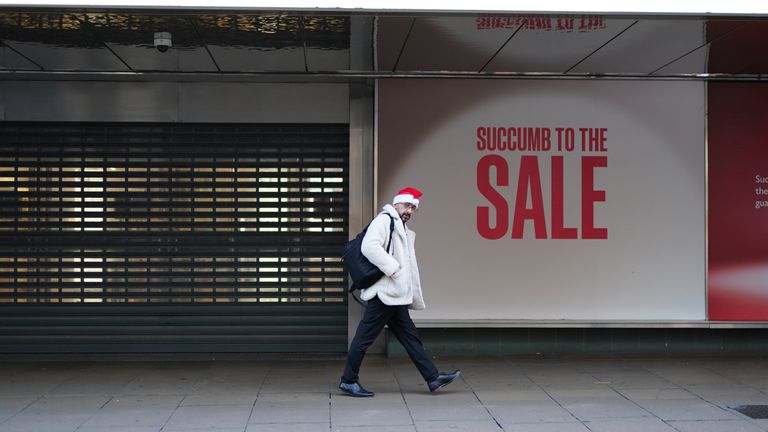Tesco raises profit forecast while M&S also reports strong Christmas sales
Tesco has raised its annual profit forecast while joining Marks and Spencer (M&S) in reporting strong Christmas sales.
Tesco, the UK’s largest retailer, said comparable sales growth over six weeks to 6 January was 6.8% higher compared to the same period last year.
The figure rose to 7.5% over the 19 weeks also covering its third quarter.
Tesco said its performance was aided by price cuts on almost 2,700 products and, despite the discounting, it now expected adjusted operating profit, its headline measure, to come in at £2.75bn for the year to the end of February.
Thinking of buying a phone? You may want to wait a week – money latest
That compared to the £2.6bn-£2.7bn range it had previously anticipated and the £2.49bn it achieved in 2022-23.
The upgraded figure prompted a union boss to accuse Tesco of profiteering.
M&S reported a better-than-expected 8.1% rise in like-for-like sales over the 13 weeks to 30 December.
It claimed a market-leading food growth result and a strong performance in womenswear but also warned about economic uncertainty ahead coupled with higher than anticipated costs from wages and business rates.
That caution and its failure to lift profit expectations contributed to a decline of more than 4.5% in its share price at the market open, with investors taking some profit after a strong run last year.
Tesco rose by almost 1%.
The companies are the latest to update on their performances over the festive period, a Christmas that has already thrown up a mixed picture.
In general terms, figures from the British Retail Consortium have suggested that sales growth has lagged the rate of inflation, with shoppers shying away from big purchases such as for furniture and high-end electronics.
While Next did not disappoint the market with its figures, another usual top performer issued a profit warning a week ago.
JD Sports said “caution” among cash-strapped consumers contributed to a weaker than expected sales result.
People appear to have been more interested in eating well, with Sainsbury’s reporting strong grocery growth but a downturn in non-food sales.
Greggs revealed strong demand.
Industry data released last week suggested that Lidl and M&S had enjoyed the best food growth over the Christmas period.
Be the first to get Breaking News
Install the Sky News app for free



Kantar Worldpanel said that high levels of promotional activity aided “record” sales for the sector as a whole despite the continuing cost of living crisis, exacerbated by higher interest rates aimed at keeping a lid on inflation.
M&S said in its trading statement: “As we enter the new year… expectations for economic growth remain uncertain, with consumer and geopolitical risks.
“We also face additional cost increases from higher than anticipated wage and business rates related cost inflation.
“Nevertheless, the strong Christmas trading performance provides confidence that the results for the year will be consistent with market expectations.”
Ken Murphy, Tesco’s chief executive, said of its Christmas: “We stepped up our investment in service over the key festive period, with more colleagues on the shop floor, helping to deliver market-leading availability and making this our best Christmas yet.
“As part of our focus on value, we offered a full Christmas dinner for just £2.09 per person, helping to drive record sales in the weeks leading up to Christmas and further market share gains.”
Its value credentials came under fire from a union boss.
Unite general secretary Sharon Graham said of Tesco’s update: “At a time when food prices continue to rise and millions of people are still struggling to feed their families, Tesco have been raking in bumper profits on the back of profiteering.
“Corporations like Tesco have done very well out of the cost-of-living crisis – unlike working people who have had to swallow inflated costs that have lined the pockets of the bosses and investors.
“The government could easily choose to prevent companies exploiting a national crisis to bank grossly excessive profits. Instead, they simply let the gravy train continue.”




